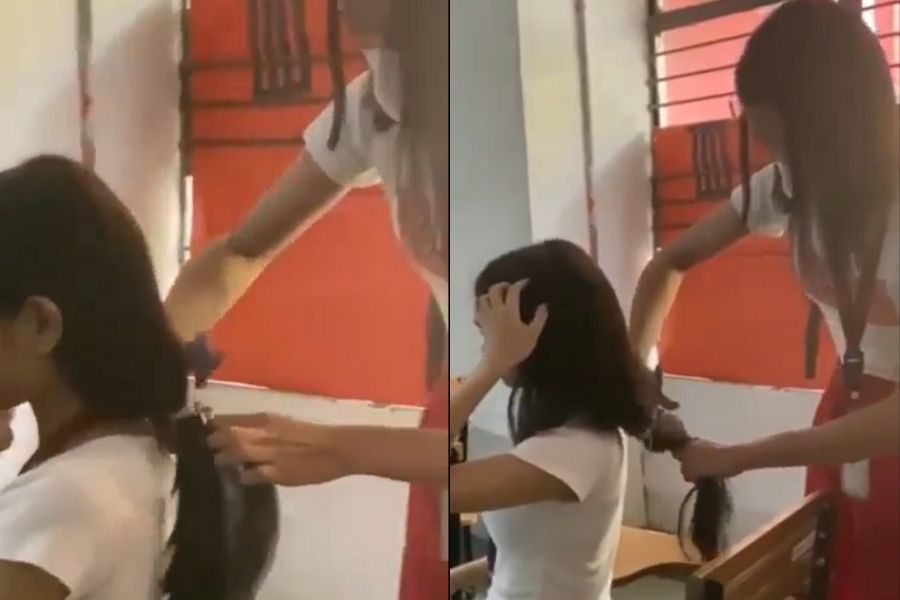EARIST urged to drop 'discriminatory' policy on hair length restrictions

MANILA, Philippines — Youth groups have called out a public university in Manila for reportedly denying enrollment to transgender students for not adhering to the hair length restrictions for male students.
A school-based student organization focused on LGBTQ advocacies said in a statement last week that the policies of Eulogio Amang Rodriguez Institute of Science and Technology (EARIST) are “outdated” and discriminatory towards students on the basis of their gender expression.
Prohibiting transgender students from enrolling unless they cut their “long hair” is a “violation of students’ rights and a clear form of discrimination,” said JP Brillantes of Bahaghari - EARIST.
This comes after videos went viral on social media allegedly showing transgender students of EARIST being pressured to cut their hair to be allowed to enroll for the school year.
However, EARIST's Office of the President has denied the alleged incident and said that the videos are "unverified."
"All students were, and are allowed to enroll for the Second Semester of School year 2023-2024, regardless of gender and particularly of how they wear/manage their hair, provided that those with long hair have them properly fixed or tied," the university said in a statement released Friday.
The statement also said that the university is eyeing changes to its implementing rules and regulations concerning enrollment after a "fruitful meeting" was held between Bahaghari - EARIST and school officials and "concerned" directors and college deans.
According to a 2023 memorandum posted on EARIST’s Facebook page, which includes provisions of its student handbook in 2021, male students are required to "observe a clean and decent haircut [barber's cut 2 inches by 3 inches] without colorful highlights," while female students are not allowed to have "colorful hair highlights."
The university’s rules on “proper decorum” only allow exceptions for working students who require a certain hairstyle for work upon approval.
The memorandum does not mention provisions in EARIST’s student handbook, if any, that allow students to wear gender-affirming uniforms or hairstyles
EARIST is located in the city of Manila, where local government officials implemented an ordinance in 2020 prohibiting discrimination on the basis of a person’s Sexual Orientation and Gender Identity Expression (SOGIE).
RELATED: Manila signs ordinance prohibiting gender discrimination
One of the prohibited acts listed in Ordinance No. 8695 is the denial of admission to students "on the basis of actual or perceived (SOGIE), including imposing disciplinary sanctions higher than customary or similar penalties, restirctions or prohibitions due to the (SOGIE) of such person or student."
Haircut 'not an obstacle' to learning
Brillantes said that Bahaghari - EARIST had filed a formal complaint with the university’s Office of the President as far back as October 2023.
Their complaint stemmed from reported incidents where transgender students were allegedly denied enrollment due to the length of their hair, with school officials reportedly saying that the students “can only enroll if their hair was cut short, or at least tied back in school premises,” Brillantes said.
The Bahaghari - EARIST member said that the hair length rule is not applied to “cisgender female students.”
“Some trans students also spoke of an instance where some of them were told to wear gender-affirming uniforms only if: ‘hindi naman halata’ (it’s not obvious)” Brillantes added.
The student leader also pointed out that students’ uniform and grooming “have never posed an obstacle to learning.”
“In fact, we LGBT youth can achieve our full potential if we are given the opportunity to express ourselves freely,” Brillantes added.
A video uploaded by Bahaghari on Wednesday showed EARIST students cutting their hair, which included a caption saying that transgender students had to trim their hair after they were “blocked from enrollment.”
Student group National Union of Students of the Philippines (NUSP) said that students should not be forced to comply with schools' "corporate standards."
"This is one example of how education has become commercialized and how it leads to regressive policies that only benefit the ruling elite," NUSP said in Filipino.
The Commission on Higher Education (CHED) said that as a general policy, they only act on these issues only after it is “resolved at the (State University and College) level first.”
“If there is no action by the SUC or if the complainant is not happy with the decision and has exhausted all administrative remedies in the SUC, then they can complain to the CHED,” CHED Chairperson Popoy De Vera told reporters on Thursday.
“If and when I receive a complaint, it will be forwarded to CHED NCR for action,” De Vera added.
Rights watchdog Human Rights Watch (HRW) previously pointed out in a 2017 report that while the Philippines has a host of policies against LGBT discrimination, these are only "strong on paper" and "not adequately enforced.”
Based on interviews with over 70 students who identified as LGBT or questioning and 46 parents or teachers, HRW found that only 15% of Filipinos reside in areas protected by local ordinances against LGBT discrimination.
Among the discriminatory practices identified by HRW are school policies that enforce “rigid gender norms” on students, including uniform or dress codes and hair length restrictions.
“These policies are particularly difficult for transgender students, who are typically treated as their sex assigned at birth rather than their gender identity,” HRW said.
“But they can also be challenging for students who are gender non-conforming, and feel most comfortable expressing themselves or participating in activities that the school considers inappropriate for their sex,” the group added.
- Latest
- Trending

























